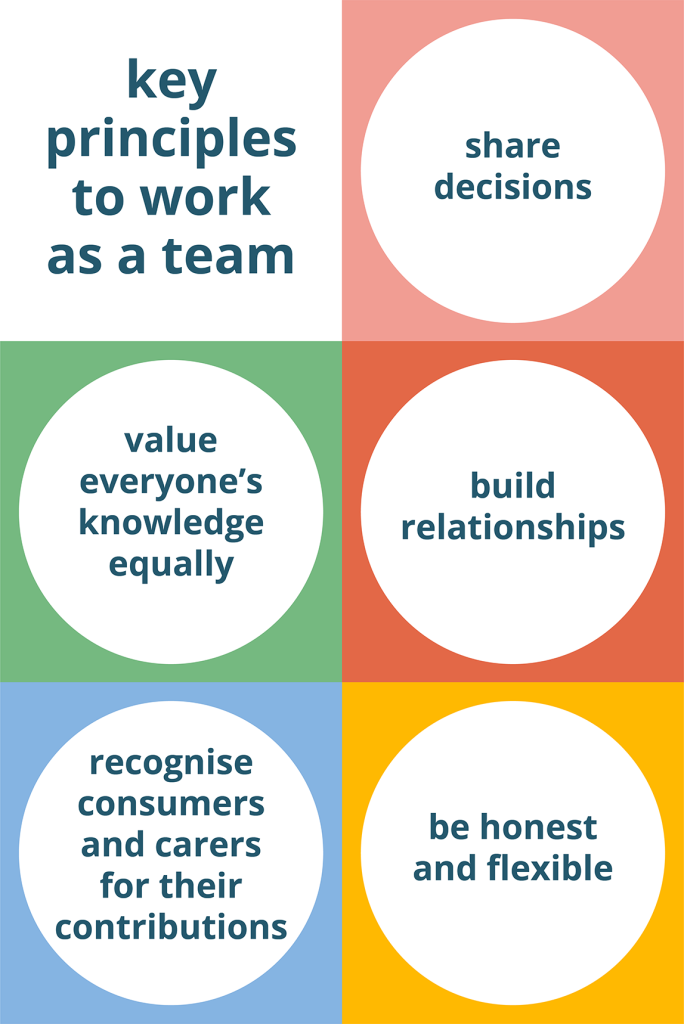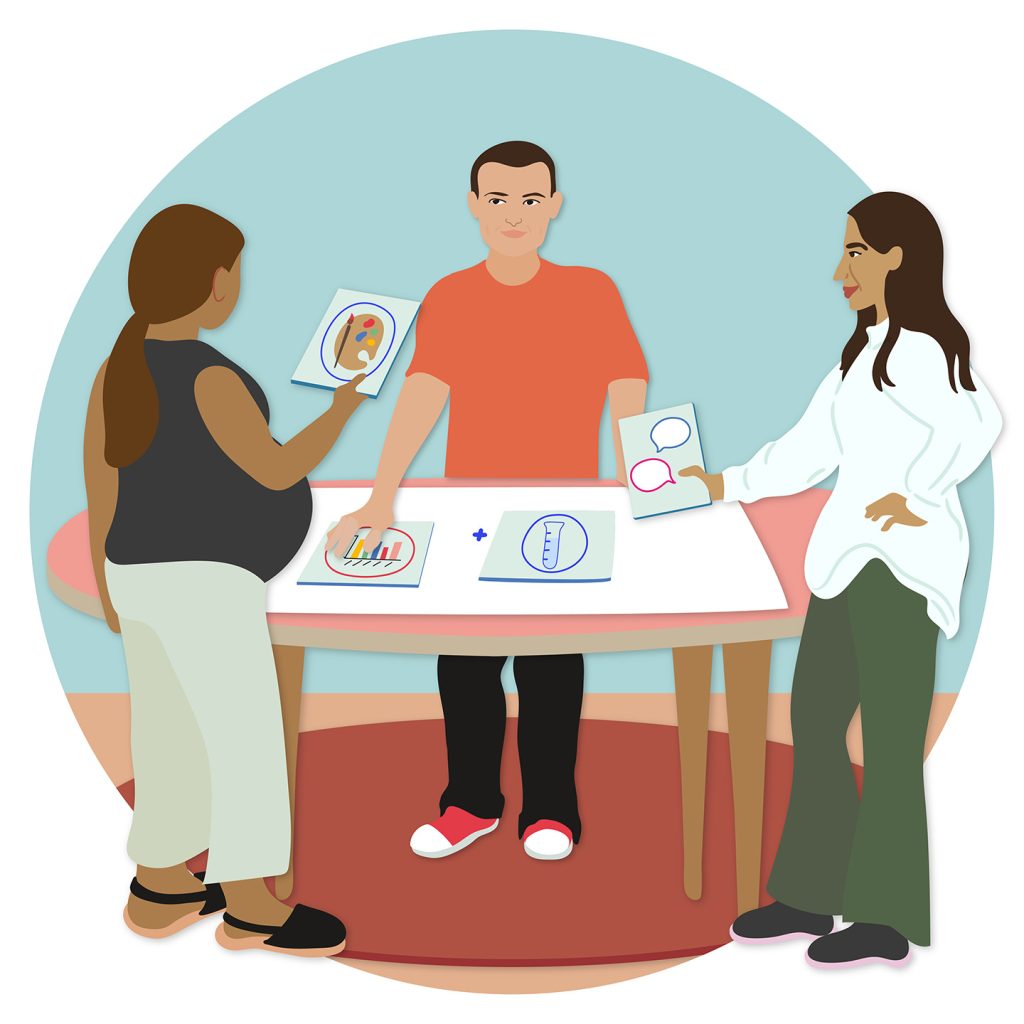- Home
- decide how to research
decide how to research
Explore different ways to do the research. Decide how to do the research and who’s doing what.
This phase can involve:
- exploring research methods and research goals
- talking about roles and responsibilities
- agreeing ways to work as a team
- working out how much co-design and co-delivery [1]
- planning research activities
- deciding on governance and leadership
- developing plans and timelines
- exploring ethical issues and community concerns
- talking openly about remuneration
- making a budget and timeline
- or something else.
Here’s what we learned from researchers, health workers and from existing resources [2,3,4,5].
- Aim to identify and budget for lived experience roles at every level of the project, from project governance through to the research team and across each research phase. Plan for peer support.
- Be explicit about what roles are available for consumers and carers throughout the work. Be open to suggestions of new roles.
- Create Plain English or Easy English position descriptions and share a draft with consumers and carers before finalising the role.
- Run meetings and workshops with care and hospitality so everyone involved can participate. Be flexible with meeting times (including out of standard work hours), places (away from clinical places) and formats. Give choices. Ensure accessibility and welcome.
- Explore methods with consumers, carers and communities in accessible and visual ways (e.g. are the methods acceptable? Is there a better way to do this?). See example from NSW Health’s method cards [5].
- Check in regularly with the team to make sure everyone feels comfortable with the decisions being made.
- Be okay with releasing some control. Show you’re willing to be challenged and challenge your own assumptions about how research ‘should’ be done.
- Learn about sensitivities (e.g. language to use and not use, histories, struggles, current advocacy) particular to a community or consumer group.
Here’s what consumers and carers told us and what we learned from other resources [2,3,5,6,7].
- Have choice and flexibility on how to take part.
- Have a say in how decisions will be made in the project.
- Get information in different formats (images, video, written, by mail) before meetings (e.g. a week before a meeting, not the day before) to think and prepare.
- Have access to peer support and time to connect with other people with lived experience outside meetings.
- Know what methods could be used beyond what the research team has already planned or commonly uses (see example of methods from NSW Health).
- Have regular team meetings and catch ups to keep everyone updated and to give each other feedback.
words to actions
five practical suggestions to put the key principles into action when deciding how to research [download PDF]
talk about roles (editable)
an example of identifying and discussing roles for people with lived experience [Download Powerpoint]
other tools (not by us)
NSW Health & Beyond Sticky Notes – engagement and design method cards [PDF] Each method is easily searched online for detailed instructions and examples
Young and Resilient Research Centre – 1-pager on ways young people can be involved in the research cycle as Co researchers [PDF]
Also relevant for adults.
Auckland Co-design Lab – framing and enabling participation guide [PDF]
8 Aboriginal Ways of Learning [website]
Tomitsch, M., et al. Design. Think. Make. Break. Repeat. [toolkit and templates]
Emma Blomkamp – shades of co-design [blog]
Respectful engagement tools by NSW Health:
- Don’t make it difficult for consumers and carers to be involved in the team (e.g. through lengthy written applications and e-learning modules, or by using overly formal interviews). Instead, prioritise warmth, access and inclusion. Think carefully about what information is really needed and how to break down complex information.
- Don’t develop timelines or budgets that make it hard to deliver the research together or that clash with periods where community are busy (such as NAIDOC, Sorry Business, Mardi Gras). Instead, have a draft project plan with opportunities for discussion. Set realistic timelines and budgets with pauses where needed.
- Don’t offer just one way to contribute (e.g. written feedback only, everyone must come to the workshop to have a say). Instead, offer different times and ways to meet and different ways to do tasks.
- Don’t claim to be the one ‘expert’ of technical or lived experience. Instead, ask: how will we decide on this together? What does each of our kinds of expertise tell us about this decision? What knowledge might we be missing?
- Don’t shut down opportunities for change by saying things like, ‘we’ve always done it this way’. Instead, explore different ways of working and ways to improve access and inclusion. Be willing to change.
- Don’t work in ‘I’ statements. Or in ‘we’ statements that don’t include people with lived experience. Instead, use ‘we’ language that includes consumers and carers. Develop and use position descriptions and terms of reference to help everyone understand their roles in supporting collective success.
[1] Blomkamp, E. (2024). Shades of Co-Design. Retrieved from https://emmablomkamp.com/blog/shades-of-co-design
[2] Western Australian Health Translation Network. (2021). Involving Consumers in Health and Medical Research: A practical handbook for organisations, researchers, consumers and funders. Retrieved from https://wahtn.org/wp-content/uploads/2021/09/WAHTN-CCI-Handbook_29092021.pdf
[3] Medical Research Future Fund. (2023). Principles for Consumer Involvement in Research Funded by the Medical Research Future Fund.
[4] Bellingham, B., Elder, E., Foxlewin, B., Gale, N., Rose, G., Sam, K., Thorburn, K., River, J. (2023). Co-design Kickstarter. Community Mental Health Drug and Alcohol Research Network, Sydney.
[5] New South Wales Government, Ministry of Health. (2023). All of Us: Six ways of working. Retrieved from https://www.health.nsw.gov.au/patients/experience/all-of-us/Pages/six-ways-of-working.aspx
[6] New South Wales Government, Ministry of Health. (2023). All of Us: Method cards. Retrieved from https://www.health.nsw.gov.au/patients/experience/all-of-us/Pages/tools.aspx
[7] Australian Clinical Trials Alliance. (n.d.). Consumers. Retrieved from https://involvementtoolkit.clinicaltrialsalliance.org.au/consumers
go back – decide what to research
go to the next section – when doing research

